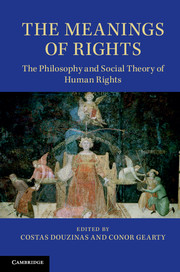Book contents
- Frontmatter
- Contents
- Notes on contributors
- Introduction
- Part I Finding foundations
- Part II Law, rights and revolution
- Part III Rights, justice, politics
- 9 From “human rights” to “life rights”
- 10 Democracy, human rights and cosmopolitanism: an agonistic approach
- 11 Plural cosmopolitanisms and the origins of human rights
- Part IV Rights and power
- Index
- References
11 - Plural cosmopolitanisms and the origins of human rights
Published online by Cambridge University Press: 05 June 2014
- Frontmatter
- Contents
- Notes on contributors
- Introduction
- Part I Finding foundations
- Part II Law, rights and revolution
- Part III Rights, justice, politics
- 9 From “human rights” to “life rights”
- 10 Democracy, human rights and cosmopolitanism: an agonistic approach
- 11 Plural cosmopolitanisms and the origins of human rights
- Part IV Rights and power
- Index
- References
Summary
In the course of 1948, the notion of human rights surged in western Europe, especially due to debates around the Universal Declaration, to be ratified by the United Nations in December of that year. While human rights did not rise so much as to define any live public option for politics in either the domestic or international spheres – notably, no movement in the service of human rights appeared — it is true that some people noticed.
One was the great German classicist Bruno Snell. When revising an essay for its inclusion in his still-renowned book The Discovery of the Mind as the debate proceeded, Snell added the following remarkable passage: “Euripides, in his Medea, is the first to portray a human being who excites pity by the mere fact of being a human being in torment,” Snell declared. He continued: “[A]s a barbarian she has no rights, but as a human being she has. This same Medea is also the first person in literature whose thinking and feeling are described in purely human terms . . . No sooner does man declare his independence of the gods, than he acclaims the authority of the free human spirit and the inviolability of human rights.” It is a remarkable set of assertions, and deserves to be placed in context. And it is helpful to define the conceptual task of writing the history of human rights even today, because it shows the need to depart from the model of the cosmopolitan discovery of humanity as a one-time breakthrough.
- Type
- Chapter
- Information
- The Meanings of RightsThe Philosophy and Social Theory of Human Rights, pp. 193 - 212Publisher: Cambridge University PressPrint publication year: 2014
References
- 2
- Cited by



